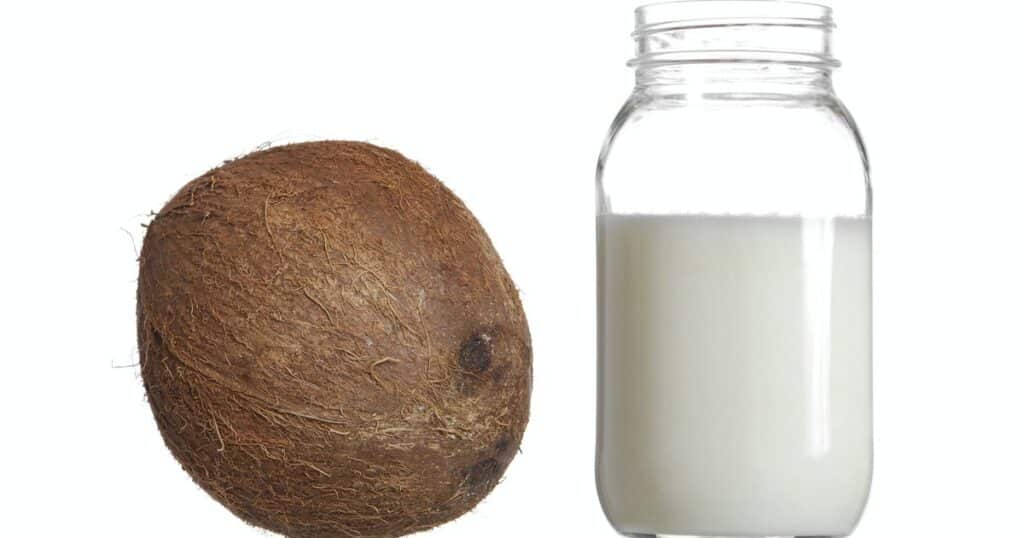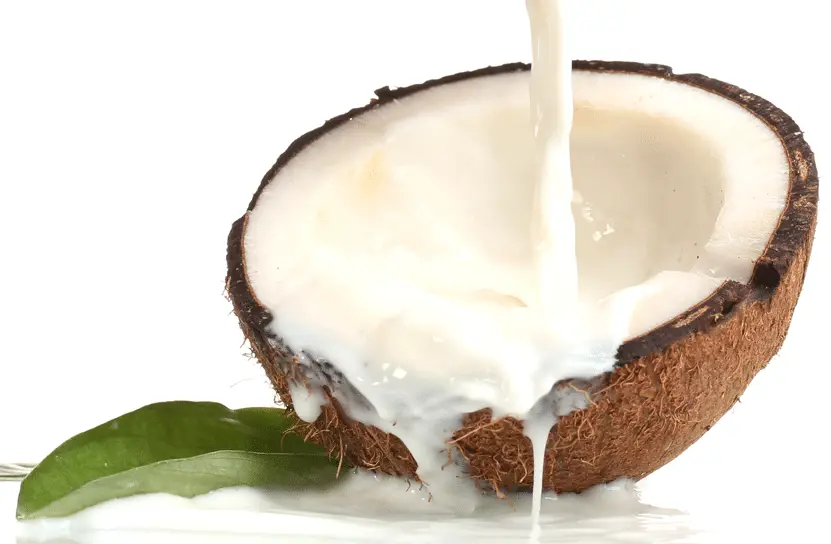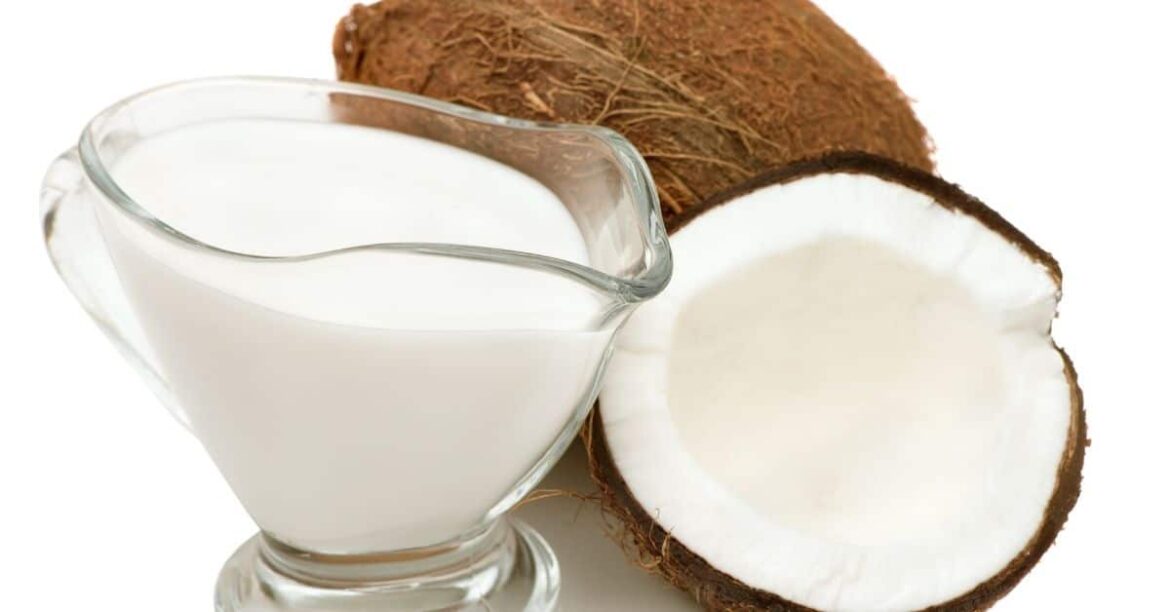Introduction
How To Use Coconut Milk For Weight Loss: Coconut milk, a creamy and delicious liquid extracted from the flesh of mature coconuts, has gained popularity not only for its culinary versatility but also for its potential benefits in aiding weight loss. While it may seem counterintuitive to use a rich, high-fat ingredient like coconut milk for shedding pounds, it’s important to understand that not all fats are created equal .Coconut milk contains a unique type of saturated fat called medium-chain triglycerides (MCTs). Unlike long-chain triglycerides (LCTs) found in most other fats, MCTs are metabolized differently in the body. They are quickly absorbed and converted into energy, rather than being stored as fat. This makes coconut milk a potential ally in your weight loss journey by increasing your overall energy expenditure.
Coconut milk is naturally dairy-free, making it an excellent alternative for those with lactose intolerance or dairy allergies. It’s also rich in vitamins, minerals, and antioxidants that can support overall health and well-being during your weight loss efforts. We will explore various ways to incorporate coconut milk into your diet to help you achieve your weight loss goals while enjoying delicious and satisfying meals. In addition to its unique fat composition, coconut milk offers several other advantages for individuals seeking to lose weight. One of its most significant benefits is its ability to promote a feeling of fullness and satiety. The healthy fats and fiber in coconut milk can help curb your appetite, reducing the likelihood of overeating and snacking on calorie-dense foods.
Coconut milk is also known to support your metabolism. The MCTs found in coconut milk may boost your metabolic rate, helping your body burn more calories even when you’re at rest. This can be especially advantageous for those looking to shed pounds efficiently. Moreover, coconut milk can enhance the flavor and creaminess of various dishes, making it an excellent addition to a balanced and flavorful diet. Whether used in curries, smoothies, oatmeal, or desserts, coconut milk can make your meals more satisfying, reducing cravings for unhealthy options.

What is better than coconut milk for weight loss?
Hemp milk. The high protein in hemp milk helps prevent cravings by making you feel full longer. Its lower calories and beneficial fatty acids are great for heart health and reducing inflammation to promote weight loss.
Almond milk has considerably fewer calories (17 per 100 grams) than coconut milk. Coconut milk is much richer in calories — 154-230 per 100 grams, depending on how thick the milk is. Thicker milk is higher in calories and fat. When it comes to choosing a milk alternative for weight loss, there are several options that can be considered better than coconut milk in terms of calorie content. One such option is almond milk, which offers a significant advantage when it comes to calories.
Almond Milk:
- Almond milk contains approximately 17 calories per 100 grams.
- It is naturally low in calories, making it an excellent choice for those looking to reduce their calorie intake during weight loss efforts.
- Almond milk is typically lower in fat compared to coconut milk.
- It is often fortified with essential vitamins and minerals, such as calcium and vitamin D, enhancing its nutritional value.
Coconut Milk:
- Coconut milk, on the other hand, is much richer in calories, ranging from 154 to 230 calories per 100 grams, depending on its thickness.
- Thicker coconut milk is higher in both calories and fat, which can contribute to a higher calorie intake if consumed in excess.
- While it offers unique medium-chain triglycerides (MCTs), which may have certain benefits for metabolism, its calorie density may not be ideal for those seeking significant weight loss.
What is the best way to use coconut milk?
Coconut milk is incredibly versatile and can be used in both sweet and savory applications. In largely dairy-free Thai cuisine, explains Chongchitnant, it’s used to add creaminess and fat to countless dishes, from sauces and dressings to curries and stews to puddings and dessert soups.
Perhaps the most classic use of coconut milk in cooking is to make curries — comforting and fragrant stews of fish, meat, or vegetables. Among my stand-by recipes are this easy fish curry and this winter vegetable curry, which I make to ward off colds. Using coconut milk in your cooking can add a rich, creamy texture and a delightful tropical flavor to a wide range of dishes. While it’s commonly associated with curries, there are numerous other creative ways to incorporate coconut milk into your culinary repertoire.
Here are some of the best ways to use coconut milk:
Curries: As mentioned, coconut milk is a staple in many curry recipes. Whether you’re making a Thai, Indian, or Caribbean curry, coconut milk adds creaminess and balances out the spices, creating a luscious sauce.
Smoothies: Replace regular milk or yogurt with coconut milk in your morning smoothie. It lends a creamy consistency and a subtle coconut flavor, complementing fruits and greens beautifully.
Soups: Coconut milk can elevate the flavor of soups, especially those with a hint of spice. Try it in a Thai-inspired Tom Kha Gai soup or a creamy butternut squash soup.
Desserts: Use coconut milk in desserts like rice pudding, panna cotta, or coconut milk ice cream. It imparts a tropical sweetness that pairs well with various flavors.
Oatmeal: Instead of water or regular milk, cook your morning oatmeal with coconut milk for a richer and more indulgent breakfast.
Is coconut water or coconut milk better for weight loss?
Well, if you’re trying to lose weight, tread carefully. Certainly, coconut water is a far better choice than saturated-fat-rich coconut oil or coconut milk, but coconut water is liquid calories – about 45 calories per cup (8 ounces).
Coconut water is a low calorie drink, while coconut milk is a high calorie one — with about a 12 fold higher number. As for their composition, it’s no surprise that coconut water contains mainly water — about 94% — and carbs while having virtually no fat and proteins. When it comes to weight loss, coconut water is indeed a better choice than coconut milk. The primary reasons for this are their calorie content and nutritional composition.
Coconut Water:
- Coconut water is a low-calorie beverage, with approximately 19 calories per 100 grams.
- It consists primarily of water, making up about 94% of its composition.
- Coconut water is naturally low in fat and proteins and primarily contains carbohydrates, mainly in the form of natural sugars.
- It is often praised for its electrolyte content, which can aid in hydration and is especially useful after exercise.
Coconut Milk:
- Coconut milk is significantly higher in calories, ranging from 154 to 230 calories per 100 grams, depending on its thickness.
- It is a creamy liquid made from coconut flesh and contains a substantial amount of fat and calories.
- While coconut milk does contain unique medium-chain triglycerides (MCTs) that may offer certain metabolic benefits, its calorie density can be a concern when trying to lose weight, especially if consumed in large quantities.
Who should not drink coconut milk?
Those hypersensitive to nuts may experience allergic reactions to coconut milk due to its relationship with tree nuts. Those with such sensitivities should avoid this drink. Limiting or avoiding its consumption can prevent these possible unwanted effects.
Weight gain and high cholesterol with increased risk of cardiovascular disease are problems related to too much coconut milk intake. It has high fiber content which can cause digestive issues like diarrhea. Those with tree nut allergies should avoid coconut milk as it could be dangerous. While coconut milk can offer various health benefits, it may not be suitable for everyone, and there are specific groups of individuals who should exercise caution or avoid it altogether.
Here are some considerations:
Individuals Prone to Weight Gain: Coconut milk is calorie-dense and high in saturated fats. Overconsumption of calorie-rich foods and beverages like coconut milk can contribute to weight gain if not carefully monitored as part of a balanced diet.
High Cholesterol and Cardiovascular Health Concerns: Due to its saturated fat content, excessive consumption of coconut milk may raise cholesterol levels, particularly LDL (bad) cholesterol. Individuals with a history of high cholesterol or cardiovascular disease should moderate their intake or choose lower-fat alternatives.
Digestive Sensitivity: Coconut milk contains a significant amount of fiber. While fiber is generally beneficial for digestive health, some individuals may be sensitive to high-fiber foods. Consuming too much coconut milk in a short period may lead to digestive discomfort, including diarrhea. Moderation is key, especially if you have a sensitive digestive system.
Tree Nut Allergies: Despite its name, coconut is not a true nut; it’s a drupe. However, it is possible for individuals with tree nut allergies to have cross-reactivity with coconut. If you have a tree nut allergy, it’s crucial to consult with an allergist or healthcare provider to determine whether coconut products, including coconut milk, are safe for you. Some individuals with tree nut allergies can safely consume coconut, while others may need to avoid it.
Individual Dietary Preferences and Goals: Coconut milk may not align with specific dietary preferences, such as a low-fat or low-calorie diet. Those with particular dietary goals, such as weight loss or maintaining specific macronutrient ratios, should be mindful of their coconut milk consumption and choose appropriate alternatives if needed.
What drink is better than coconut milk?
Cashew milk
It has a smoother, creamier texture than other nut milks and mimics the consistency of cow’s milk. It’s naturally low in calories and protein but packs more fat than most plant-based milks ( 5 ). Alternatively, you can use cashew cream, which has an even higher fat content and is as creamy as coconut milk.
Coconut water is relatively low in calories, with approximately 45-60 calories per cup (240 ml). It is a popular choice for those seeking a low-calorie and hydrating beverage. On the other hand, coconut milk is higher in calories due to its higher fat content.When considering a low-calorie and hydrating beverage, coconut water is an excellent choice, especially compared to coconut milk, which is higher in calories due to its fat content.
However, if you’re looking for alternatives that are equally low in calories and hydrating, you have several options:
Plain Water: Nothing beats good old-fashioned water for hydration. It has zero calories and is readily available and accessible.
Herbal Tea: Herbal teas, such as mint or chamomile tea, are calorie-free and can be both soothing and hydrating.
Green Tea: Green tea is low in calories and has been associated with various health benefits, including potential weight management benefits.
Cucumber Water: Infusing water with cucumber slices adds a refreshing twist without adding many calories.
Lemon Water: A squeeze of lemon in water not only adds flavor but also provides a touch of vitamin C. It’s a low-calorie and refreshing option.
What is a healthier alternative to coconut milk?
Soy milk is a great alternative to coconut milk. It’s also plant-based and has a slightly lower fat content than coconut milk. In most recipes, you can swap it in a 1:1 ratio. If you’re looking to add more protein to your diet, soy milk is a good option.
In recipes where the fat content doesn’t compromise texture, you plant-based beverages, such as coconut milk beverage, almond, cashew, macadamia, oat, soy or hemp, to substitute for traditional coconut milk. These plant-based beverage options would be best for smoothies, coffees and specialty drinks.When seeking a healthier alternative to traditional coconut milk, especially for recipes where the fat content isn’t critical for texture, you have a variety of plant-based beverages to choose from. These alternatives can be used in place of coconut milk and are suitable for various culinary purposes.
Here are some healthier plant-based alternatives:
Almond Milk: Almond milk is a popular and versatile option. It’s low in calories, naturally lactose-free, and can be used in cooking, baking, smoothies, and as a dairy milk substitute in coffee.
Cashew Milk: Cashew milk is creamy and mild in flavor. It’s relatively low in calories and can work well in both sweet and savory dishes.
Macadamia Milk: Macadamia milk is creamy and has a slightly buttery flavor. It’s a good option for those seeking a richer milk substitute.
Oat Milk: Oat milk is known for its creamy texture and neutral flavor. It’s often used in coffee, lattes, and as a milk replacement in baking recipes.
Soy Milk: Soy milk is a protein-rich option that can be used in a wide range of recipes, including baking, cooking, and beverages.
Is coconut good for weight loss at night?
One can consume it during the day or even at night but consuming it during certain times of the day will definitely help you reap more benefits. Consuming coconut water on an empty stomach early in the morning can help you not in one but many ways.
One can consume it during the day or even at night but consuming it during certain times of the day will definitely help you reap more benefits. Consuming coconut water on an empty stomach early in the morning can help you not in one but many ways.Coconut water can be consumed at any time of the day or night, and it offers various health benefits. However, whether you consume it at night or during the day doesn’t significantly impact its potential benefits for weight loss. The key to weight loss is overall calorie intake and a balanced diet, rather than the timing of specific foods or beverages.
That said, here are some potential benefits of consuming coconut water:
Hydration: Coconut water is naturally rich in electrolytes, making it an excellent choice for staying hydrated. Proper hydration is important for overall health, including supporting weight management.
Low in Calories: Coconut water is relatively low in calories compared to many other beverages, particularly when consumed without added sugars or flavorings. Choosing low-calorie beverages can be part of a weight-conscious diet.
Nutrient Content: Coconut water contains essential vitamins, minerals, and antioxidants, which can contribute to overall health and well-being. These nutrients can be beneficial regardless of when you consume coconut water.
What can replace coconut milk?
8 best substitutes for coconut milk
- Shredded coconut (and a blender)
- Coconut cream.
- Plant-based milk and coconut oil.
- Coconut water and plant-based milk.
- Coconut cream.
- Milk or plant-based milk.
- Evaporated milk.
- Heavy cream or half-and-half.
- When it comes to replacing coconut milk in a recipe, the choice of substitute depends on the specific recipe and dietary preferences or restrictions.
Here are some alternatives for coconut milk:
Shredded Coconut (and a Blender): You can make your own coconut milk by blending shredded coconut with water. This homemade coconut milk can be used as a substitute in many recipes.
Coconut Cream: Coconut cream is thicker and richer than coconut milk. You can dilute it with water to achieve a consistency closer to regular coconut milk.
Plant-Based Milk and Coconut Oil: Mixing a plant-based milk (like almond, soy, or oat milk) with a small amount of coconut oil can mimic the flavor and richness of coconut milk. This works well in recipes like curries and soups.
Coconut Water and Plant-Based Milk: Combining coconut water with a plant-based milk can offer a lighter alternative to coconut milk. It’s suitable for recipes where a milder coconut flavor is acceptable.
Milk or Plant-Based Milk: In some recipes, especially those that don’t require a strong coconut flavor, regular milk or a plant-based milk like almond, soy, or oat milk can be used as a substitute for coconut milk.

Conclusion
Coconut milk can be a helpful ally in your weight loss journey when used wisely. While it offers unique benefits such as medium-chain triglycerides (MCTs) that can potentially support metabolism and satiety, its calorie density should be taken into consideration. Moderation is key, as coconut milk is calorie-rich, and excessive consumption can hinder weight loss efforts.
To harness the benefits of coconut milk for weight loss, incorporate it thoughtfully into your diet. Use it in recipes that truly benefit from its creamy texture and tropical flavor, like curries, smoothies, or desserts. Balance is essential; it’s crucial to monitor portion sizes and calorie intake. Remember that successful weight loss is about overall calorie management, a well-rounded diet rich in nutrient-dense foods, and regular physical activity.
While coconut milk can play a role in your weight loss plan, it should be part of a holistic approach that prioritizes healthy lifestyle choices. Consult with a healthcare or nutrition professional to tailor its usage to your specific dietary needs and weight loss goals. With the right balance and mindfulness, coconut milk can be a delicious and supportive component of your weight management strategy.


5 comments
… [Trackback]
[…] Find More on to that Topic: thefitnessblogger.com/how-to-use-coconut-milk-for-weight-loss/ […]
… [Trackback]
[…] Information on that Topic: thefitnessblogger.com/how-to-use-coconut-milk-for-weight-loss/ […]
… [Trackback]
[…] Read More Information here on that Topic: thefitnessblogger.com/how-to-use-coconut-milk-for-weight-loss/ […]
… [Trackback]
[…] Find More Info here to that Topic: thefitnessblogger.com/how-to-use-coconut-milk-for-weight-loss/ […]
… [Trackback]
[…] Find More on on that Topic: thefitnessblogger.com/how-to-use-coconut-milk-for-weight-loss/ […]